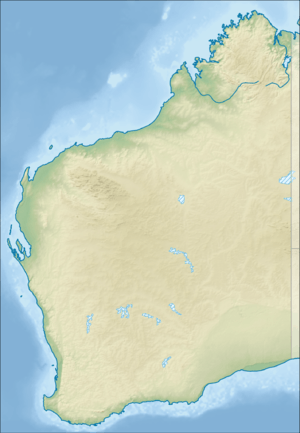Corunna Downs Airfield
Corunna Downs Airfield was a secret Royal Australian Air Force (RAAF) base at Corunna Downs, 40 km (25 mi) south of Marble Bar, Western Australia in the Pilbara Region during World War II.[2]
| Corunna Downs Airfield | |||||||||||||||||||||||||||||||||
|---|---|---|---|---|---|---|---|---|---|---|---|---|---|---|---|---|---|---|---|---|---|---|---|---|---|---|---|---|---|---|---|---|---|
| Part of World War II | |||||||||||||||||||||||||||||||||
| Pilbara Region Near Marble Bar in Australia | |||||||||||||||||||||||||||||||||
 Corunna Downs Airfield location of the airbase in Western Australia | |||||||||||||||||||||||||||||||||
| Coordinates | 21°26′00″S 119°46′58″E | ||||||||||||||||||||||||||||||||
| Type | Airbase | ||||||||||||||||||||||||||||||||
| Site information | |||||||||||||||||||||||||||||||||
| Owner | Royal Australian Air Force | ||||||||||||||||||||||||||||||||
| Operator | No. 73 Operational Base Unit RAAF[1] | ||||||||||||||||||||||||||||||||
| Open to the public | Yes | ||||||||||||||||||||||||||||||||
| Condition | Poor | ||||||||||||||||||||||||||||||||
| Site history | |||||||||||||||||||||||||||||||||
| Built | 1942 | ||||||||||||||||||||||||||||||||
| In use | until 14 January 1946 | ||||||||||||||||||||||||||||||||
| Fate | Abandoned | ||||||||||||||||||||||||||||||||
| Events | Long range missions against Japanese shipping and base facilities in the Dutch East Indies | ||||||||||||||||||||||||||||||||
| Garrison information | |||||||||||||||||||||||||||||||||
| Occupants | Australian
United States
| ||||||||||||||||||||||||||||||||
| Airfield information | |||||||||||||||||||||||||||||||||
| |||||||||||||||||||||||||||||||||
The airfield, created especially for heavy bombers, comprised two intersecting bitumen runways, a north–south (165°) runway 5,000 ft × 150 ft (1,524 m × 46 m) and an east–west (107°) runway 7,000 ft × 150 ft (2,134 m × 46 m).[2]
No. 73 Operational Base Unit was responsible for operating the airfield during World War II.
The RAAF No. 24 Squadron, No 25 Squadron and the United States Army Air Corps 380th Bomb Group flew long range missions against Japanese shipping and base facilities in the Dutch East Indies.[2]
The base has been abandoned since World War II.
References
- Kerr, Colin (21 January 2013). "Bombers hidden in the desert". The West Australian. Retrieved 1 May 2016.
- "Register of Heritage Places" (PDF). Archived from the original (PDF) on 30 September 2007. Retrieved 5 August 2012.